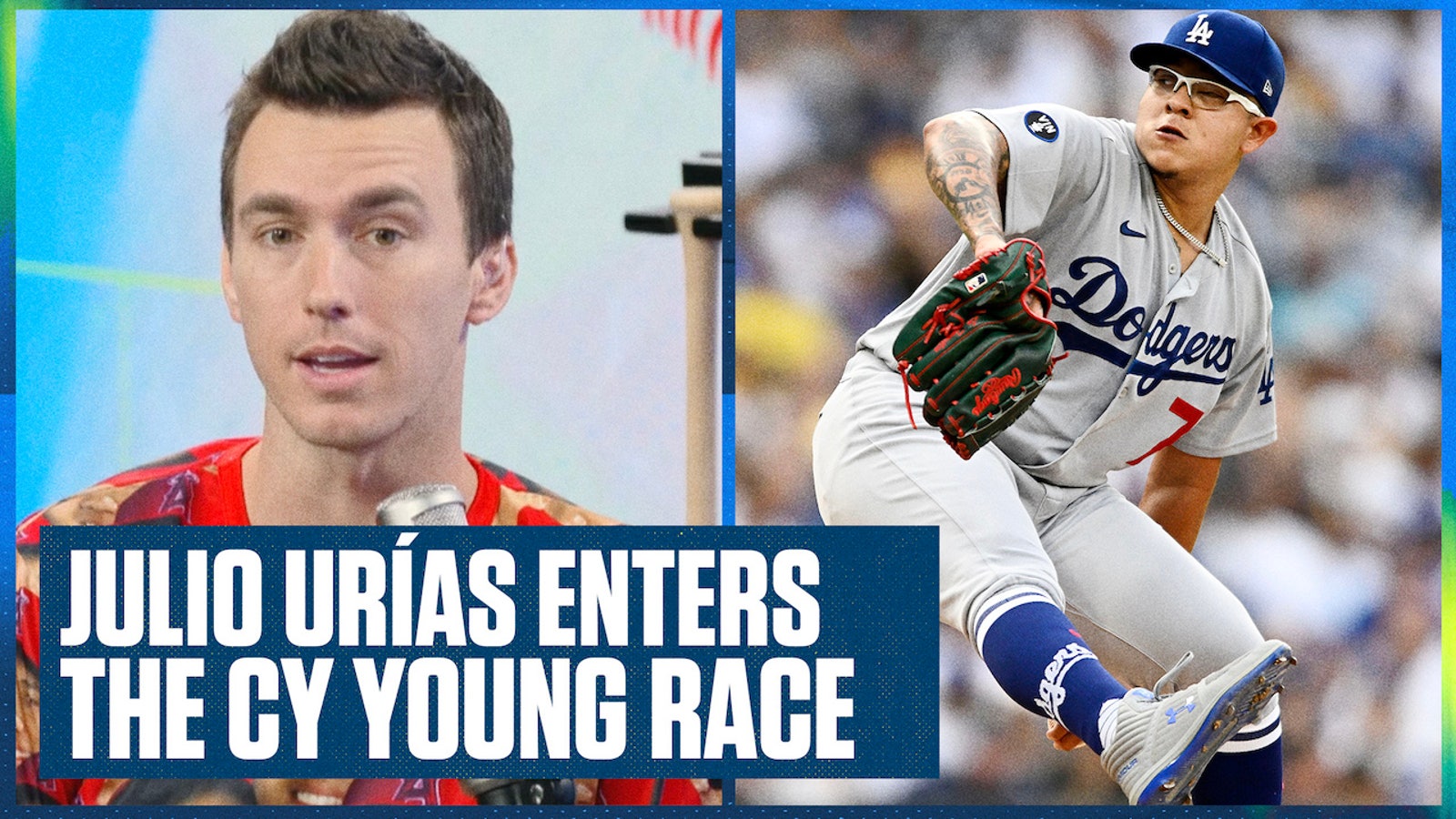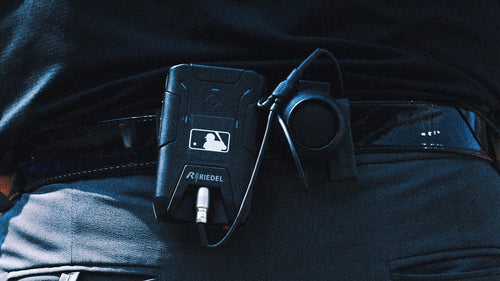
Dodgers' Game 1 starter Julio Urías ready to seize the moment
By Rowan Kavner
FOX Sports MLB Writer
At the top of Julio Urías' locker sits a bobblehead of Austin Barnes celebrating the Dodgers’ 2020 World Series win. The 26-year-old pitcher, reminded of that joyous night, can’t help but smile when he sees it.
The Barnes figurine is looking straight ahead, two arms in the air, with a baseball in his right hand, replicating the scene at Globe Life Field. Sixty feet and six inches away, the man who threw the final strikeout knelt almost to a crouch, pumping both of his fists on the mound before letting out a scream and embracing his catcher and teammates.
If anyone was unfamiliar with Urías before that moment, the star of the Dodgers’ first championship in 32 years was impossible to overlook then.
"The whole world got to see it," Dodgers president of baseball operations Andrew Friedman said. "I feel like, in some ways, that was kind of his coming-out party."
Urías, for so long a promising prospect oozing with potential, had transformed into the Renaissance man of the Dodgers' pitching staff, shifting seamlessly that October between starting and relief roles to finish off the final nine Braves batters in Game 7 of the National League Championship Series before ending the Rays by recording the last seven outs in Game 6 of the World Series.
Every time Urías glances at the bobblehead in his locker, those memories flood back. Soon, he’ll have a chance to create more.
"I think that’s the motivating factor — so much this year, more than ever," Urías said. "You felt the win, and then you also felt how deflating it was to lose [last year]. You’re trying to get back to that point of winning."
The feeling is different for the wunderkind from Culiacán, Mexico, as he prepares for this year’s postseason, his development from teenage sensation to frontline major-league ace now reaching its climax.
Urías is no longer the Swiss Army Knife pitcher constantly switching roles. He is battle-tested, the trusted ace the Dodgers will start Tuesday in Game 1 of the National League Division Series against the Padres.
"I think there’s always questions of how guys will handle a moment, how guys will handle October," Friedman said. "With Julio, that’s never a question."
Getting to this point has required patience, on the part of both the Dodgers’ front office and Urías himself.
Six years ago, Urías became the youngest starting pitcher in major-league postseason history when he took the mound in Game 4 of the 2016 NLCS at 20 years, 68 days old.
One year later, his career became shrouded in uncertainty.
Despite the Dodgers’ careful handling of his workload, the left-hander underwent anterior capsule surgery on his throwing shoulder five starts into the 2017 season. Manager Dave Roberts wondered if Urías would ever return to form — or even pitch again. Most pitchers who undergo the procedure never look the same. Then again, most pitchers who undergo the operation aren't 20 years old.
"I think with the shoulder, there’s always unknown," Roberts said. "But he’s a guy you can’t bet against."
Urías missed almost two years before returning for three appearances at the end of the 2018 season. At just 22 years old, having thrown only four major-league innings from June 2017 to the start of the 2018 postseason, Urías pitched in seven playoff games that year, including three World Series matchups.
The Dodgers continued to handle him with extreme care, keeping an eye toward the future as they considered how to deploy him the next few seasons.
"He’s always been the player that’s wanted more," Roberts said.
Urías threw 79⅔ innings in 2019 while seeing his velocity tick up a couple notches, but he spent nearly the entire season in the bullpen to keep his innings in check and prepare him for his postseason role. Looking back, with his massive expectations now realized, Urías understands the Dodgers’ long view — even if his competitiveness drove him to want more.
"I think it’s one of the hardest things I had to learn, especially coming in so young," he said. "You feel like you can attack the world. You feel like you can pitch every single inning, make every single pitch. You have to learn there’s time. There’s a process."
MLB Playoffs: Dodgers vs. Padres NLDS preview
His ascension to this point took shape two years ago, when he altered his breaking ball, ditching his 12-6 curveball in favor of a slurve that guided him to greatness in October and helped the Dodgers to a championship. After spinning his curveball just 6.1% of the time in 2019, Urías went to his new-look slurve 22.6% of the time in the truncated 2020 season.
That number grew to 34.2% last season, when opponents hit .155 with 76 strikeouts against the pitch. By then, the reins were removed from the precocious phenom. Urías fired a career-high 185⅔ innings in 2021 and became the Dodgers’ first 20-game winner since Clayton Kershaw in 2014.
"He's lived up to everything that we had hoped for and more," Roberts said. "He was obviously a highly touted prospect, and for him to realize all those expectations, he's done that and more."
While Urías' pitch mix didn’t change from 2020 to '21, catcher Will Smith noted a difference in the development of another pitch. Opponents hit .316 against his changeup in 2020. Last year, opponents batted just .194 with 36 strikeouts against the pitch, which allowed him to last longer through a game and a season.
Urías also became more efficient in 2021, landing first-pitch strikes a career-high 70.7% of the time. An elevated innings count never impacted his play down the stretch. In fact, he went 9-0 with a 2.04 ERA in the season’s second half.
Still, despite Urías’ success, he was treated differently from most aces once October arrived. He threw as many games in relief as he started. After the season, despite his major-league-best 20-3 record, he finished seventh in NL Cy Young Award voting.
"People are going to do or say what they want to say or show recognition when they want to show it, but you can’t get too focused on that," Urías said. "My focus is on doing the best I can — not proving them wrong or proving them right. It’s proving myself right and proving to myself I can do this every fifth day."
He is doing that again this year — and taking further strides.
Urías believes he has gained a better understanding of how to attack an opponent and a better feel for when to use each pitch. He can make adjustments depending on a hitter’s aggressiveness. Sometimes, he’ll modify his arm slot and surprise a batter by dropping down lower. He will tinker with his velocity, too, often ramping up as a start continues or reaching back for more when the situation demands. He’s throwing 1.2 mph faster in the sixth inning of games than he is in the first.
"There’s some things you learn along the way that you didn’t have in your repertoire when you first started doing this," Urías said. "There’s days where I don’t have my best stuff. There’s days where I’m tinkering during the games or trying to get through games that I wouldn’t have navigated through in the past. This time, I know how to do it, how to take a different approach, how to listen to other people."
Dodgers' Julio Urías should be in Cy Young conversation
Among those people are his pitching coaches, Mark Prior and assistant Connor McGuiness.
"He knows who he is, and he knows what he’s trying to do," McGuiness said. "He’ll even come to Mark and I and tell us, ‘Hey, this is what I’m working on in my next bullpen. These are the drills I’m going to do.’ He has the blueprint for his own success now, and that’s really scary for a guy his age who’s won a World Series."
In mid-July, after Urías surrendered five runs in two innings to the Cubs, he used the following bullpen session to make adjustments to his lower half in an effort to better drive through the baseball. His velocity picked up. The clunkers disappeared. From July 16 through the end of the regular season, he allowed two runs or fewer in each of his 14 starts.
Throughout that time, what stood out most to Freddie Freeman was how every pitch from Urías was competitive. Freeman had faced Urías in the previous two postseasons, but this version looked amplified, more consistent. Every pitch had a purpose.
"It’s mentally draining," Freeman said. "That’s what Julio, I think, has done this year and done so well — that every pitch is meaningful. If it's a ball, it's setting up the next pitch or setting up two pitches from there. The game plan and the preparation and the competitiveness behind every pitch is, I think, what sets Julio apart."
Friedman, Roberts and teammates Max Muncy, Gavin Lux and Tyler Anderson all made note of Urías’ competitiveness. This year in particular, the Dodgers have needed it.
Walker Buehler was lost for the season to Tommy John surgery in June, and hard-throwing right-hander Dustin May didn't return from his own Tommy John surgery until August. Kershaw missed time due to back injuries on two occasions. Cy Young contender Tony Gonsolin suffered through a late-season forearm strain.
Through it all, Urías stabilized the top rotation in baseball, starting a team-high 31 games, yet he was not among the Dodgers’ three All-Star pitchers.
He took note. After the break, Urías went 9-1 with a 1.26 ERA and finished the 2022 season by winning the NL ERA title.
"There are some things that did motivate me, some things that did put a little pride back into me," Urías admitted. "Not making the All-Star Game was a motivator, and it did push me. At the same time, learning myself and what I can do, how I can approach each start or each batter, that process — like I said before, being able to have that routine — has been very beneficial."
Urías looks at the full season the same way he does an individual game. With both, if he has a tough start, he feels confident that he can compose himself and find a way through.
After allowing six runs in two innings in the season opener, Urías allowed one or zero runs in each of his next four starts. Every time he allowed more than two runs in a start this year, he responded by allowing one or zero runs the next time out.
"When I watch him pitch, he just makes it look so easy," teammate Andrew Heaney said. "It just looks like he kind of cruises through games, but he’s got really great stuff, pounds the strike zone, and it just feels like you look up six, seven innings later, and he’s given up none or one run."
That's why the Dodgers will put the ball in Urías’ hand to begin postseason play Tuesday. He will take the mound with a yearning to return to the World Series, a desire made stronger by last season’s deflating NLCS exit.
Before he does, though, he’ll look up at his locker and smile.
"With all the criticism that goes with that 2020 shortened season, we want to finish off strong and win it this year," he said.
Rowan Kavner covers the Dodgers and NL West for FOX Sports. He previously was the Dodgers’ editor of digital and print publications. Follow him on Twitter at @RowanKavner.












